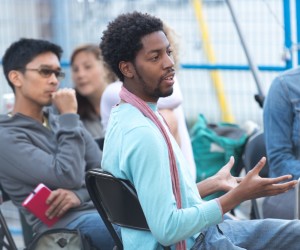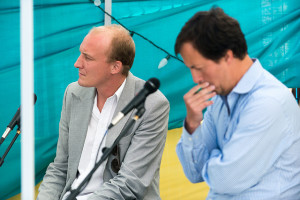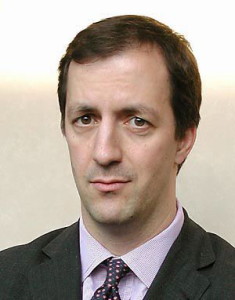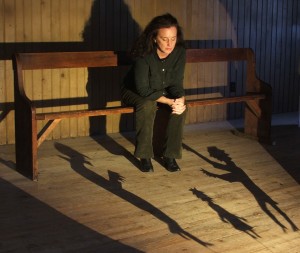
Andrew Coyne is questioned about the role of expertise in the cultural sector. Photo: Dahlia Katz
As moderator of the ‘An End To Arts Funding?‘ debate at SummerWorks, it seems unethical for me to engage in any sort of critique of the arguments presented Wednesday.
I hope to moderate more debates in the future, and I can’t have debaters wary that although I am quite pleasant in person, I’m storing their arguments for digital deconstruction post-event.
However, there have been a number of responses from people who were in attendance and have posted their thoughts online:
My response to @acoyne‘s position on arts funding: different arts have different economic realities. http://t.co/8FzdvuAZEe @SummerWorks
— Holger Syme (@literasyme) August 15, 2013
Hypothesis: the real market forces holding back theatre in TO are the costs of producing: space rental, wages. Not inability to sell tix.
— Rob Salerno (@robsalerno) August 14, 2013
Shop Talk #4 AN END TO ARTS FUNDING? was yesterday -here’s what you missed from the Blog:… http://t.co/IfpNHklXtX
— SummerWorks (@SummerWorks) August 15, 2013
I don’t actually want batman. Responding to @acoyne from the @Summerworks debate moderated by @michaelcwheeler http://t.co/17ssG5oMjD
— Jacob Zimmer (@jacobzimmer) August 15, 2013
Fun debating arts funding w/Nadia Ross at @SummerWorks this eve. Doubt I persuaded many, but here’s the full case: https://t.co/ei4N6i1M41
— Andrew Coyne (@acoyne) August 14, 2013
And of course, before the debate Nadia Ross published this ‘opening statement’ here on Praxis:
AN END TO ARTS FUNDING? Nadia Ross previews her debate w/ @acoyne at @SummerWorks http://t.co/RGsUkas2i7 #cdnpoli
— Praxis Theatre (@praxistheatre) August 7, 2013

Photo: Dahlia Katz
Tangentially, a conversation came up at the debate connected to an ongoing discussion in this space: performance and memory.
Mr. Coyne conceded there was probably some role for the state to play in archiving and preserving great works, noting that mark of a great writer is their words survive themselves and their era.
As theatre artists, we can’t aspire for our work to be preserved in the same way. You were either there, or you weren’t, and you missed it. Gone forever. We can archive notes, programs, props – even scripts – but the work itself cannot be preserved (as Holger Syme also notes in his post to makes a different point) in a way that it can be reproduced .
This is neither here nor there with regards to the substance of the debate, but it reminds me that part of what makes live performance distinct is it is ephemeral and I am cool with that.
]]> This week SummerWorks Artistic Director Michael Rubenfeld asked me to moderate today’s debate on the question: An End to Arts Funding? Of course I agreed.
This week SummerWorks Artistic Director Michael Rubenfeld asked me to moderate today’s debate on the question: An End to Arts Funding? Of course I agreed.
It looks to be an exciting discussion, and I look forward to facilitating a fair and rigorous debate on the future of public investment in the arts.
PARTICIPANTS:
PRO: Andrew Coyne
CON: Nadia Ross
Moderator: Michael Wheeler

Andrew Coyne
FORMAT:
INTRO
Bios and Format introduced by Moderator
PRO
Opening statements 7 minutes
CON
Asks any clarifying questions 3 minutes
CON
Opening statements 7 minutes
PRO
Asks any clarifying questions 3 minutes
PRO
Responds to CON arguments and/or connects to their own 7 minutes

Nadia Ross
CON
Responds to PRO arguments and/or connects to their own 7 minutes
PRO
Closing Statement 5 minutes
CON
Closing Statement 5 minutes
AUD
5 x Questions From Audience:
2 minutes max per question, 3 minutes max to respond. 20-ish minutes
SummerWorks 2013 Debate. Lower Ossington Theatre, August 14, 2013 @ 5pm
]]> On August 14th, as part of SummerWorks Performance Festival’s Shop Talk series, I will be having a debate with journalist Andrew Coyne (Postmedia, CBC’s The National) on the question: “An end to arts funding?”.
On August 14th, as part of SummerWorks Performance Festival’s Shop Talk series, I will be having a debate with journalist Andrew Coyne (Postmedia, CBC’s The National) on the question: “An end to arts funding?”.
Most of our revenue at STO Union comes from international festivals. But any creations that we’ve made at STO Union, usually started with a small grant.
When I look at what STO Union has accomplished over the years, on paper, it looks amazing: we’ve toured to the top festivals in the world, we’ve created small pieces that have long shelf lives and that bring in more revenue from fees than any grants they ever receive. But the reality of the job is that it has been more of a vocation than anything else.
I left Toronto officially in 2004. What propelled me out of the city was that I couldn’t stand seeing up close the capitulation of the art world to the market.
I had to find some kind of psychic ‘space’ that was still ‘free’, so I moved to a village in Quebec.
When I think ‘market’, I think of the square in my village where locals go to see their produce and wares. Down the block, there are two churches, restaurants, entertainment venues and a community centre. There are places of business, places for contemplation, places for entertainment, and a place for the community to gather. There’s also a post office, a fire department, and a hospital. I can see more sharply how society functions through the lens of the smaller scale that a village offers me.
What I am seeing is that the separation between what occupies human time is being eroded: when you’ve placed ‘money’ at the top of your priorities, then everything becomes the ‘market’: it affects the way we relate to each other, what we do with our time, how we work. All interactions become subtly, (and sometimes not so subtly), defined by this.

The market takes over the territory and empties it out of its most precious and unique qualities, turning everything into ‘work’. It’s like an invasion or an infection: slowly taking over our relationships, our time, our attention until that is all that we see. For me, as an artist, now is the time to respond to this, with all hands on board.
A recent letter from a professor to the students of Goldsmiths (University of London) to the students sums it up:
“Perhaps you disagree with my point of view – I can understand that you might be entirely resigned to the notion that capitalism will never be overcome. Maybe you have moved beyond this resignation into a full-blown cynicism. The impression you as artists give is often that everything has already been recuperated, that all radicalism is produced broken, that all resistance is already integrated into the capitalist whole. Your works often make the claim of regretting this, but it is a false claim insofar as it is a process to which they happily contribute. Clearly, few of you are actually interested in a critique of capitalism (but a pseudo-critique that sells will have to do), but for those of us who care about art, for those of us who think that art’s critical capacities have not been exhausted and extinguished, for those of us for whom the abolition of capitalism is not a choice but a necessity, you are the enemy.”
The debate I am having with Andrew Coyne is based on completely insane premises:
it doesn’t matter any more whether we go to the governments or to the business community for money to do our Art projects because the government is now too deeply influenced by the business community and corporate state. The liberal class failed to confront the rise of the corporate state and now it ceases to function.
Ultimately, the concept of ‘we don’t feed those who bite the hand that feeds them’ makes all funded art-work ultimately impotent. If it becomes too potent the funding will be withdrawn.
For myself, capitulation to the market has nothing to do with what ‘the people want and are willing to pay for’, it has to do with surrendering our last strongholds, the last bits of territory that the market doesn’t fully control. Without those free and open spaces, we are all just slaves in denial.
Nadia Ross is the artistic director for STO Union, one of the company’s at this year’s SummerWorks Performance Festival (7 Important Things). She lives in Wakefield, Quebec.
*Note the printed SummerWorks Guide incorrectly lists this debate as being on August 11th – it is in fact on August 14th at the Performance Bar at 5pm.
]]>